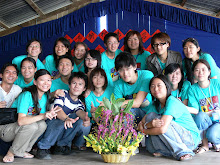News from BBC http://news.bbc.co.uk/2/hi/asia-pacific/7313997.stm
Six months after protests in Burma ended in a military crackdown, people describe the atmosphere in the country and their fears for the future.
REPORTER, NAY PYI TAW
Buddhist monks were the focal point of protests last September
Life has been hard as ever. No change or hope has come yet to us.
People no longer talk about politics for fear of arrest, accusations, safety and other frightening things.
But everybody desires to know something more and to talk freely about these issues. Some day we hope to have our freedom or right to speak. Ha ha. What a joke!
Everything has been over for nearly six months now. But some of us still recall it.
Here, a referendum on a new constitution is drawing near. People are talking about it and no-one really knows what it is going to look like.
But almost everybody accepts that the government will win it whether the constitution is ratified or not by the people in May.
Even now almost everybody has little understanding of what the referendum is and what has to happen.
I have been in the capital Nay Pyi Taw for a few months now. More construction sites are still being built as more NGOs and private companies have to move here somehow.
They say Nay Pyi Taw is the capital and its future lies with the new democratic government body. There is no sign yet of how the military will stand after the results are out.
ANONYMOUS BURMESE MAN, RANGOON
I tell people not to even think about voting 'No' or 'Yes' [in the forthcoming referendum on a new constitution]. It means that you consider and accept it.
Actually, the junta does not have the right to do anything for the country. It is an illegal government.
Night is dark without electricity, water is scarce
Even if the work done is good, and the result or outcome is exceptional progress as in China, it is unacceptable because it is a military dictatorship and the junta is unconstitutional - having no law, rules and regulations.
Now the country suffers complete loss and ruin.
Its people are totally destroyed both physically and mentally - the majority are living in a mess, eating junk food, leading a hand-to-mouth lifestyle.
There is no guarantee for healthcare. If a man does not have enough money, in case one needs to go to hospital or a private clinic for serious cases, he should prepare to die. The cost is sky high.
People now become mad and irrational as a result of poverty and a lack of education.
Night is dark without electricity. Water is scarce. How is it like a modern and developed country to which, they say, they are marching?
DAVID, RANGOON
In recent times, we have not been able to use the internet because the government decreased the internet bandwidth during the visit of UN envoy Mr Gambari.
Nothing has changed after six months in Burma. The military junta has arrested our leaders and many activists. Now they've spread many soldiers across Rangoon to break down any movements.
They will have a constitutional referendum in May. They don't care for the UN and the international community.
What would the UN do to get the true result from referendum?
YI, RANGOON
The internet connection was at its worst during the September revolution. There has been little improvement.
Now the junta is showing its strength by patrolling around the town with trucks fully loaded with policemen
Sending information to foreign media can be indicted by the junta and we will be jailed. But we the people of Burma take this risk by sending mails to foreign media because we have to let the people of the world know our situation in our country.
The junta is putting heavy guards around Rangoon and monitoring the mails and the internet because they are going to hold a fake referendum in May.
They haven't [at the time of writing] published the constitution we are to vote on. They dare not let the people of Burma study the constitution thoroughly and freely.
Now the junta is showing its strength by patrolling around the town with trucks fully loaded with policemen and soldiers carrying guns. It is a warning to the people who go against the junta that they will be shot.
Now the junta is arresting and putting into jail without giving reasonable explanation for the people who go against the junta.
2008年4月9日 星期三
2008年2月25日 星期一
「思沙龍」你所不知道的緬甸強調以建設性的作為取代冷酷的封鎖與制裁
2008/2/18‧龍應台文化基金會 回到台灣NPO新聞稿索引
龍應台文化基金會「思沙龍」2日以「你所不知道的緬甸」為題,邀請政治大學國關中心第二研究所所長金榮勇主講,基金會執行長李應平主持。金榮勇強調,面對緬甸的政治封閉與高壓統治,國際社會應以建設性的作為,取代強硬冷酷的封鎖與制裁。
為了拓展台灣年輕人的國際視野,培養深思論辨的能力,龍應台基金會持續策劃「思沙龍」。2008年第一季思沙龍以「內戰」為主軸,繼蘇丹達佛後,探討「你所不知道的緬甸」,吸引近300位民眾到場聆聽,前駐廷大使戴瑞明、獨立記者張桂越,以及泰緬地區華裔難民權益促進會執行長劉小華和數位緬甸籍在台學生也到場分享。
緬甸位於東亞、東南亞與南亞三區交界點,金榮勇從戰略位置角度切入,強調緬甸國際地位的重要性。尤其,七○年代緬甸因非人道的軍事政權受到國際制裁,選擇靠向中國大陸,中國也藉由緬甸,將勢力伸入印度洋,擴大在亞洲的控制力;九○年代中期,緬甸軍政府更縱容金三角地區居民生產鴉片,以賺取外匯,引發國際關憂。
金榮勇認為,緬甸軍政府以威權治國,高壓禁制人民言論與自由,甚至以關閉仰光大學等愚民政策來打擊民主運動,雖令人民痛苦萬分,但民主運動領袖翁山蘇姬認為國際企業與資本在緬投資行為,等於間接幫助軍政府鞏固政權,而主張應對軍政府實施經濟制裁,暫停投資與觀光,這個主張勢由於會影響緬甸的經濟發展,反使緬甸人民權衡理想與現實陷入兩難。
金榮勇以美國用人權為理由攻打伊拉克,卻容許像緬甸的非人道情形繼續存在為例,國際社會為維護自身在緬甸的經濟利益,刻意輕忽緬甸的非人道現況。而中國大陸則為區域發展策略,在番紅花革命後,於聯合國會議中針對各國對緬甸提出制裁的提案,從中阻饒。他強調美中等大國,實應抱持理想,負起維護國際制序的責任。
泰緬地區華裔難民權益促進會執行長劉小華發言表示,緬甸問題複雜難解,她特別提出緬甸華人至今仍不被緬甸政府承認,處於無國籍的狀態,回溯歷史,緬甸華人至今仍強烈認同中華民國,因此她呼籲台灣政府應該主動協助解決其困境。
一位緬甸籍在台學生回應,緬甸的社會氛圍與台灣解嚴前相當類似,資訊十分封閉,只要不談政治,生活就可以維持看似平靜的運作,因此他反而是到了台灣之後才真正開始了解緬甸。至於軍政府為何能五十多年仍屹立不搖,他認為應是軍政府長期實施種族分化策略,讓民族之間互相攻擊,從中取得政治利益穩固政權。
在場民眾關心,紅番花革命後,緬甸現今的內部情勢為何?一位曾在緬甸教書兩年,從事非營利工作的民眾表示,緬甸目前表面平靜,但政府仍私下持續進行異議份子的逮捕行動。她表示緬甸華人雖然人數有限,且無法取得公民身分,但卻擁有很強的經濟實力;而緬人則社經地位較低,生活清苦,她質疑如果華人與緬人之間能相互合作,緬甸的問題是否得以紓緩?金榮勇回應,東南亞各地都存在華人與當地人民如何相處,緬甸族群封閉,加上政府採取的分化政策,想法雖好,卻難以實現。
主持人李應平問道,緬甸近年來在外交採開放政策,對內卻又持續高壓保守,這種衝突與矛盾的手段,對緬甸的民主化有何影響?金榮勇回應,開放的外交政策是因應東協的施壓,事實上對軍政府而言也確有實際的經濟效益,但軍政府更相信絕對不能讓1988年敗選的錯誤再次發生,為了維護軍政府的政權,威權統治必定會持續下去,事實上,開放造成的經濟成長,確實也讓溫和的緬甸人民選擇了面對生活的現實。因此,金榮勇認為翁山蘇姬可能將成為一顆被犧牲的棋子,他對緬甸民主化的看法則是持續悲觀。
金榮勇強調,緬甸的經濟與觀光開放政策,其實也是增加人民對外的溝通管道,國與國之間應該有建設性的接觸,避免「比鄰若天涯」的孤立,長遠來看對緬甸的發展必然有益。基金會執行長李應平則呼籲,當掌有權力者利用分化種族或其他政治手段取得或維護自己的利益時,人民更要具有智慧與眼光,看清政客的蓄意恫嚇與虛幻假象。
龍應台文化基金會「思沙龍」2日以「你所不知道的緬甸」為題,邀請政治大學國關中心第二研究所所長金榮勇主講,基金會執行長李應平主持。金榮勇強調,面對緬甸的政治封閉與高壓統治,國際社會應以建設性的作為,取代強硬冷酷的封鎖與制裁。
為了拓展台灣年輕人的國際視野,培養深思論辨的能力,龍應台基金會持續策劃「思沙龍」。2008年第一季思沙龍以「內戰」為主軸,繼蘇丹達佛後,探討「你所不知道的緬甸」,吸引近300位民眾到場聆聽,前駐廷大使戴瑞明、獨立記者張桂越,以及泰緬地區華裔難民權益促進會執行長劉小華和數位緬甸籍在台學生也到場分享。
緬甸位於東亞、東南亞與南亞三區交界點,金榮勇從戰略位置角度切入,強調緬甸國際地位的重要性。尤其,七○年代緬甸因非人道的軍事政權受到國際制裁,選擇靠向中國大陸,中國也藉由緬甸,將勢力伸入印度洋,擴大在亞洲的控制力;九○年代中期,緬甸軍政府更縱容金三角地區居民生產鴉片,以賺取外匯,引發國際關憂。
金榮勇認為,緬甸軍政府以威權治國,高壓禁制人民言論與自由,甚至以關閉仰光大學等愚民政策來打擊民主運動,雖令人民痛苦萬分,但民主運動領袖翁山蘇姬認為國際企業與資本在緬投資行為,等於間接幫助軍政府鞏固政權,而主張應對軍政府實施經濟制裁,暫停投資與觀光,這個主張勢由於會影響緬甸的經濟發展,反使緬甸人民權衡理想與現實陷入兩難。
金榮勇以美國用人權為理由攻打伊拉克,卻容許像緬甸的非人道情形繼續存在為例,國際社會為維護自身在緬甸的經濟利益,刻意輕忽緬甸的非人道現況。而中國大陸則為區域發展策略,在番紅花革命後,於聯合國會議中針對各國對緬甸提出制裁的提案,從中阻饒。他強調美中等大國,實應抱持理想,負起維護國際制序的責任。
泰緬地區華裔難民權益促進會執行長劉小華發言表示,緬甸問題複雜難解,她特別提出緬甸華人至今仍不被緬甸政府承認,處於無國籍的狀態,回溯歷史,緬甸華人至今仍強烈認同中華民國,因此她呼籲台灣政府應該主動協助解決其困境。
一位緬甸籍在台學生回應,緬甸的社會氛圍與台灣解嚴前相當類似,資訊十分封閉,只要不談政治,生活就可以維持看似平靜的運作,因此他反而是到了台灣之後才真正開始了解緬甸。至於軍政府為何能五十多年仍屹立不搖,他認為應是軍政府長期實施種族分化策略,讓民族之間互相攻擊,從中取得政治利益穩固政權。
在場民眾關心,紅番花革命後,緬甸現今的內部情勢為何?一位曾在緬甸教書兩年,從事非營利工作的民眾表示,緬甸目前表面平靜,但政府仍私下持續進行異議份子的逮捕行動。她表示緬甸華人雖然人數有限,且無法取得公民身分,但卻擁有很強的經濟實力;而緬人則社經地位較低,生活清苦,她質疑如果華人與緬人之間能相互合作,緬甸的問題是否得以紓緩?金榮勇回應,東南亞各地都存在華人與當地人民如何相處,緬甸族群封閉,加上政府採取的分化政策,想法雖好,卻難以實現。
主持人李應平問道,緬甸近年來在外交採開放政策,對內卻又持續高壓保守,這種衝突與矛盾的手段,對緬甸的民主化有何影響?金榮勇回應,開放的外交政策是因應東協的施壓,事實上對軍政府而言也確有實際的經濟效益,但軍政府更相信絕對不能讓1988年敗選的錯誤再次發生,為了維護軍政府的政權,威權統治必定會持續下去,事實上,開放造成的經濟成長,確實也讓溫和的緬甸人民選擇了面對生活的現實。因此,金榮勇認為翁山蘇姬可能將成為一顆被犧牲的棋子,他對緬甸民主化的看法則是持續悲觀。
金榮勇強調,緬甸的經濟與觀光開放政策,其實也是增加人民對外的溝通管道,國與國之間應該有建設性的接觸,避免「比鄰若天涯」的孤立,長遠來看對緬甸的發展必然有益。基金會執行長李應平則呼籲,當掌有權力者利用分化種族或其他政治手段取得或維護自己的利益時,人民更要具有智慧與眼光,看清政客的蓄意恫嚇與虛幻假象。
2008年2月24日 星期日
訂閱:
文章 (Atom)
